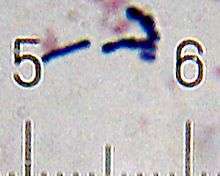Bifidobacterium animalis
Bifidobacterium animalis is a gram-positive, anaerobic, rod-shaped bacterium of the Bifidobacterium genus which can be found in the large intestines of most mammals, including humans.
| Bifidobacterium animalis | |
|---|---|
 | |
| Scientific classification | |
| Domain: | Bacteria |
| Phylum: | Actinobacteria |
| Class: | Actinobacteria |
| Order: | Bifidobacteriales |
| Family: | Bifidobacteriaceae |
| Genus: | Bifidobacterium |
| Species: | B. animalis |
| Binomial name | |
| Bifidobacterium animalis (Mitsuoka 1969) Scardovi and Trovatelli 1974 | |
| Subspecies | |
|
B. a. animalis | |
Bifidobacterium animalis and Bifidobacterium lactis were previously described as two distinct species. Presently, both are considered B. animalis with the subspecies Bifidobacterium animalis subsp. animalis and Bifidobacterium animalis subsp. lactis.[1][2][3]
Both old names B. animalis and B. lactis are still used on product labels, as this species is frequently used as a probiotic. In most cases, which subspecies is used in the product is not clear.
Trade names
Several companies have attempted to trademark particular strains, and as a marketing technique, have invented scientific-sounding names for the strains.
Danone (Dannon in the United States) markets the subspecies strain DN 173 010 as Bifidus Digestivum (UK), Bifidus Regularis (US and Mexico), Bifidobacterium Lactis or B.L. Regularis (Canada), DanRegularis (Brazil), Bifidus Actiregularis (Argentina, Austria, Belgium, Bulgaria, Chile, Czech Republic, France, Germany, Greece, Hungary, Israel, Italy, Kazakhstan, Netherlands, Portugal, Romania, Russia, South Africa, Spain and the UK), and Bifidus Essensis in the Middle East (and formerly in Hungary, Bulgaria and The Netherlands) through Activia from Safi Danone KSA.
Chr. Hansen A/S from Denmark has a similar claim on a strain of Bifidobacterium animalis subsp. lactis, marketed under the trademark BB-12.[4]
Lidl lists "Bifidobacterium BB-12" in its "Proviact" yogurt.
Bifidobacterium lactis Bl-04 and Bi-07 are strains from DuPont's Danisco FloraFIT range. They are used in many dietary probiotic supplements.
Therelac contains the strains "Bifidobacterium lactis BI-07" and "Bifidobacterium lactis BL-34" (also called BI-04) in its probiotic capsule.[5]
Bifidobacterium lactis HN019 is a strain from Fonterra licensed to DuPont, which markets it as HOWARU Bifido. It is sold in a variety of commercial probiotics, among them Tropicana Products Essentials Probiotics,[6] Attune Wellness Bars[7] and NOW Foods Clinical GI Probiotic.[8] Fonterra has a yogurt that is sold in New Zealand called Symbio Probalance, where the strain is labelled as DR10.
Research
Bifidobacterim animalis subspecies lactis BB-12 administered in combination with other probiotics has showed "a trend toward increased remission" in a study of 32 patients with ulcerative colitis.[9]
Products
B. animalis is present in many food products and dietary supplements. The probiotic is mostly found in dairy products.[10]
Health concerns
The manipulation of the gut flora is complex and may cause bacteria-host interactions.[11] Although probiotics, in general, are considered safe, there are concerns about their use in certain cases.[11][12] Some people, such as those with compromised immune systems, short bowel syndrome, central venous catheters, heart valve disease and premature infants, may be at higher risk for adverse events.[13] Rarely, consumption of probiotics may cause bacteremia, and sepsis, potentially fatal infections in children with lowered immune systems or who are already critically ill.[14]
References
- "Bifidobacterium". Retrieved 2007-07-08.
- Masco, Liesbeth; Marco Ventura; Ralf Zink; Geert Huys; Jean Swings (July 2004). "Polyphasic taxonomic analysis of Bifidobacterium animalis and Bifidobacterium lactis reveals relatedness at the subspecies level: reclassification of Bifidobacterium animalis as Bifidobacterium animalis subsp. animalis subsp. nov. and Bifidobacterium lactis as Bifidobacterium animalis subsp. lactis subsp. nov". Int J Syst Evol Microbiol. 54 (part 4): 1137–1143. doi:10.1099/ijs.0.03011-0. PMID 15280282. Archived from the original on 2007-09-29. Retrieved 2007-07-14.
- Ventura M, Zink R (December 2002). "Rapid Identification, Differentiation, and Proposed New Taxonomic Classification of Bifidobacterium lactis". Appl Environ Microbiol. 68 (12): 6429–6434. doi:10.1128/aem.68.12.6429-6434.2002. PMC 134397. PMID 12450873.
- "Archived copy". Archived from the original on 2015-03-21. Retrieved 2014-01-28.CS1 maint: archived copy as title (link)
- http://www.theralac.com/inside-theralac.aspx
- "Archived copy". Archived from the original on 2016-10-21. Retrieved 2016-10-20.CS1 maint: archived copy as title (link)
- http://www.powerofprobiotics.com/HOWARU-Bifido.html
- http://www.swansonvitamins.com/now-foods-clinical-gi-probiotic-60-veg-caps
- Ghouri YA, Richards DM, Rahimi EF, Krill JT, Jelinek KA, DuPont AW (Dec 9, 2014). "Systematic review of randomized controlled trials of probiotics, prebiotics, and synbiotics in inflammatory bowel disease". Clin Exp Gastroenterol (Review). 7: 473–87. doi:10.2147/CEG.S27530. PMC 4266241. PMID 25525379.
- "American Society for MicrobiologyApplied and Environmental Microbiology." Strain-Specific Genotyping of Bifidobacterium Animalis Subsp. Lactis by Using Single-Nucleotide Polymorphisms, Insertions, and Deletions. N.p., n.d. Web. 03 June 2014.
- Durchschein F, Petritsch W, Hammer HF (2016). "Diet therapy for inflammatory bowel diseases: The established and the new". World J Gastroenterol (Review). 22 (7): 2179–94. doi:10.3748/wjg.v22.i7.2179. PMC 4734995. PMID 26900283.
- Boyle RJ, Robins-Browne RM, Tang ML (2006). "Probiotic use in clinical practice: what are the risks?". Am J Clin Nutr (Review). 83 (6): 1256–64, quiz 1446–7. doi:10.1093/ajcn/83.6.1256. PMID 16762934.
- Doron S, Snydman DR (2015). "Risk and safety of probiotics". Clin Infect Dis (Review). 60 Suppl 2: S129-34. doi:10.1093/cid/civ085. PMC 4490230. PMID 25922398.
- Singhi SC, Kumar S (2016). "Probiotics in critically ill children". F1000Res (Review). 5: 407. doi:10.12688/f1000research.7630.1. PMC 4813632. PMID 27081478.
External links
- whatisbifidusregularis.org/ – A deconstruction of the terms Bifidus Actiregularis, Bifidus Regularis, Bifidus Digestivum, L. Casei Immunitas and their variants, as well as the marketing strategy, and information about the potential health benefits of live yoghurts.
- Food-Info.net – How to select a probiotic
- Type strain of Bifidobacterium animalis at BacDive - the Bacterial Diversity Metadatabase